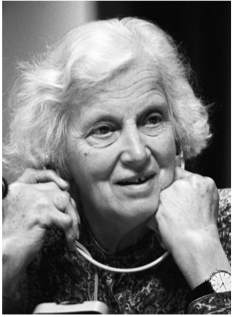|
|
|
Programme et séances saison 3 2016-2017 > jeudi 29 septembre 2016 Pnina G. Abir-Am (WSRC, Brandeis University, USA), Dorothy C. Hodgkin’s (1910-1994) subtle exercise of power in and out of science: From an Empire of the Dispossessed to a sole Nobel, Pugwash, and PerestroikaEn ce début d'année, nous recevons Pnina Abir-Am (WSRC, Brandeis University, USA), le jeudi 29 septembre 2016 de 14h à 16h30 (créneau exceptionnel) au Centre Koyré (salle du 5e étage) Dorothy C. Hodgkin’s (1910-1994) subtle exercise of power in and out of science: From an Empire of the Dispossessed to a sole Nobel, Pugwash, and Perestroika.
Abstract: ESHS’s recent Meeting in Prague (Sept. 22-24, 2016) “Science and Power, Science as Power”, inspired me to refocus my projected talk on Dorothy Hodgkin in your Series so as to explore her little known but wide-ranging exercise of power. A sole Nobel Laureate, (1964) Hodgkin is best known for her lab’s solutions of the structures of key biomedical compounds (e.g. penicillin, vitamin B-12, and insulin). Given the obstacles faced by women scientists as an under-represented group in science, t h e question persists as to how Hodgkin still managed to have a global influence on both science and international politics. I argue that this r a r ef e a twas made possible by opportunities early in her career to practise the exercise of power on powerless groups of scientists. Her research associates included mostly women students, refugees of both genders, (from fascism in the 1930s and WW2) and post/colonial visitors or immigrants during the Early Cold War, to the effect that her lab resembled a veritable “empire of the dispossessed”. Nevertheless, as befits a daughter of the British Empire who came of age in the inter-war era, Hodgkin ran her lab gently but firmly.Hodgkin’s career built on the initial support of her progressive Ph.D. adviser, J.D. Bernal, (1901-1971) a guru of the scientistic left in UK, yet she balanced science and politics in more subtle ways than he did. For example, while he had to seek promotion outside the University of Cambridge where his lab was viewed as a “little Moscow”, she managed to pursue a life long career at Oxford, albeit in a research track. Eventually, she came ahead of her, mostly male, colleagues in science while solving several complex biomolecularstructures in the period between the mid-1940s and the late- 1960s.Hodgkina l s oservedasPresidentoftheInternationalCongressof Crystallography, (1972) as well as President of Pugwash. (1975-85) She reached the realm of global politics when as adviser to her former failed student, Margaret Thatcher, the longest serving British PM, Hodgkin persuaded the “Iron Lady” to take a favorable policy toward the Soviet Union during Perestroika. The talk seeks to clarify how Hodgkin's clever use of “powerless” sources of power enabled her n o t o n l y t o escape the usual predicament of women in science, buttoexertaglobalinfluence.Thetalkconcludeswithc o m p a r i n gtheways H o d g k i nisrememberedinEurope,India,andChinaasculturalstrategiesforthe empowerment of women in science.
|
| Personnes connectées : 1 | Flux RSS |

|


